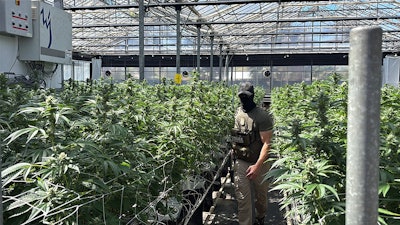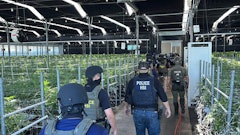
Glass House Brands executives expect the July 10 ICE raids at two of their cannabis cultivation sites in Southern California to harm their third-quarter performance, but plan for the company to come out stronger in the long run.
Kyle Kazan, the company’s co-founder, chairman and CEO, told investors during a conference call on Aug. 13 that onboarding new farm labor contractor workers and getting them to full capacity “will take time” and impact Glass House’s financial results for the third quarter and subsequent quarters.
The U.S. Immigration and Customs Enforcement’s (ICE) search warrant operations at Glass House’s grow sites last month in Carpinteria (Santa Barbara County) and Camarillo (Ventura County) resulted in federal agents arresting 361 people and taking 14 migrant children into custody. One worker, employed by a third-party contractor, died following injuries he sustained during the raid.
According to an Aug. 4 company update from Glass House, nine of its employees were detained or arrested, while the other approximately 350 individuals detained or arrested were either employees of third-party contractors or were unassociated with the company (protestors or bystanders). After the raids, Glass House terminated its relationship with two farm labor contractors, engaged new contractors and made myriad changes to its labor practices to enhance compliance.
As a result of a reduced labor force, Glass House has scaled back new planting “more significantly” in recent weeks, Kazan told investors on Wednesday.
“In the near term, we are pushing some of our biomass processing into the fourth quarter,” he said. “Processing is the most labor-intensive activity in our cultivation at the farm, so delaying this allows us to utilize our currently reduced labor force while we ramp back up to full production. This delay will result in our sales team having less biomass products available to sell in the wholesale channel during the third quarter and will cause a meaningful reduction to revenues and profitability for the period.”
Specifically, the company reported $59.9 million in second-quarter 2025 revenue, including $42.1 million in revenue achieved from its wholesale biomass business, accounting for 70% of the total. However, Glass House executives expect third-quarter 2025 revenue to be between $35 million and $38 million—roughly $25 million to $30 million below where the company was tracking before the ICE raids.
Impacted by reduced labor, the company now expects to produce between 95,000 and 100,000 pounds of biomass for the third quarter, which represents less than 40% of what is typically expected, Glass House Chief Financial Officer Mark Vendetti told investors.
However, as the company works toward ramping up staffing, executives expect that production to double in the fourth quarter and for revenues to rebound close to last year’s fourth quarter result of $53 million.
“The average Q3 selling price for wholesale biomass is assumed to be between $178 and $183 per pound, down from $229 last year, while cost of production will be approximately $160 per pound,” Vendetti said. “The cost of production is high because of the low production in the quarter and labor inefficiency of bringing on a new workforce. We expect fourth quarter cost of production to be approximately $110 per pound as production increases and efficiency improves as the workforce gains experience.”
The third-quarter expectations compare to Glass House producing 231,000 pounds of biomass at $91 per pound in the second quarter while paying its labor contractors roughly $18.60 per hour on average. The company has 6 million square feet of cultivation facilities in the state, including 5.5 million square feet among six greenhouses on its 165-acre farm in Southern California.
Vendetti said the company anticipates gross margin in the second half of the year to be in the mid-30% range after it was 53% for the second quarter. Glass House also expects full-year 2025 revenue to be down roughly 15% from what was previously anticipated.
In addition, the company is slowing some components of its expansion, including its greenhouse No. 2 retrofit. Also, Glass House is delaying the construction of its greenhouse No. 4 retrofit, specifically related to its hemp expansion effort.
However, Glass House remains committed to hemp as a “fantastic opportunity to California’s agriculture industry and existing cannabis growers who have been burdened by compressed pricing and onerous taxes to pivot to selling hemp via interstate commerce,” Kazan said.
The CEO said the company is using its experience of a reduced labor force and scaled-back production in the third quarter as an opportunity to accelerate its automation efforts and refine operations to promote greater efficiencies for future growth.
Graham Farrar, the company’s co-founder, president and board director, said he anticipates Glass House to “come out of this” stronger than it went in.
“We’ve always been looking at automation and efficiency from day one,” he said. “We’ve very much been a long-term focused company. What this has done is accelerated and broadened our scope on that. … over time, we’ll lower our costs quicker.”
To help ensure the company doesn’t fall victim to—or at least minimizes the impacts of—future ICE raids, Glass House hired compliance consultants, including Julie Myers Wood, the former director of ICE and assistant secretary of Homeland Security, to assist with employee eligibility from contractors. In addition, all employees and farm labor are now E-verified with enhanced age-gating controls, and the company signed a labor peace agreement with the Teamsters.
Farrar said he wouldn’t wish the impacts from the ICE raids on anybody and that the general impacts are not cannabis-specific, but rather agricultural.
“If this is the new world that agriculture is going to be living in, I would much rather have the first-mover advantage and be at the top of the mountain first rather than last,” he said. “So, we made the decisions to do the things that we did so that we’re essentially bulletproof on everything going forward and don’t have to worry about what happens next.”
With those changes in place, the company is now focused on getting back to full operations, Kazan said.
“Like every obstacle we faced over 10 years, we will persevere and be that much more resilient as a company,” he said. “It is this grit developed as a team, more than anything else, which makes us the outlier in the cannabis industry.”



























